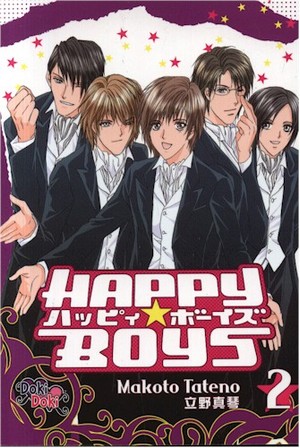- Comics
- Comics Reviews
- Manga
- Comics Reviews
- European Comics
- News
- Comics News
- Press Releases
- Columns
- Spotlight
- Digital Comics
- Webcomics
- Cult Favorite
- Back Issues
- Webcomics
- Movies
- Toys
- Store
- More
- About
By Leroy Douresseaux
May 16, 2010 - 08:49
 |
| Happy Boys Volume 2 cover image is courtesy of Anime Castle Books. |
Comedy/Drama; Rated “13+ Teens”
Happy Boys is a manga based upon a Japanese television series and adapted into comics form by the prolific manga-ka, Makoto Tateno (Hero-Heel). In this series, the words, “Welcome home, madam,” transport the woman hearing them into a world where mannered servants take care of her every need.
The series is set at Lady Braganza, a butler café where patrons can immerse themselves in a high-class lifestyle and enjoy an afternoon of tea and cake. Tuxedo-wearing footmen attend to their each and every need. To make sure they live up to his exacting standards, manager Sakatoru Katano intensely watches his staff, which includes veteran first footmen, Eve and Silk, and the newer footmen: Shiva, Renjo, and Ivory. Meanwhile, patissier Kiichi Fukawa is in the kitchen preparing the finest deserts and sweet treats.
As Happy Boys, Vol. 2 opens, the wild past of footman, Junta “Renjo” Akasaka, causes trouble for Lady Braganza. An old rival of Junta’s has suddenly appeared, and in revenge, has hatched a plan to entice the café’s patrons over to a host club. Then, disaster strikes the café when the employees ruin canisters of hard-to-find seasonal teas, and Katano rushes out to buy more. But these teas really are hard-to-find!
Finally, a favorite customer, a young woman named Yuna Niregasaki, asks Kyoichi “Shiva” Segawa to beginning training to replace her own aging butler. This job would be a step up for Shiva, but does he want leave? Most of all, he wonders if his coworkers, who are like family to him, care if he leaves Lady Braganza.
THE LOWDOWN: A workplace drama and comedy, Happy Boys is built on light-hearted situations depicting the employees helping one another and being together. When they occasionally hinder one another, that presents an opportunity to fix things, make up, and form stronger bonds. There is little here in the way of complex dramatic conflict; what conflict there is happens to be soft, like the kind found in Saturday morning cartoons.
The characters are somewhat bishounen – male characters with androgynous features – in appearance, but this narrative doesn’t have a yaoi or romantic angle. Happy Boys, however, is a bromance because this manga is about young men being intimate in the most non-sexual way possible, although there is a hint that a few might not mind being romantically involved with a co-worker… or two.
Like a cup of hot cocoa and a snuggly, warm blanket, Happy Boys is something I’d like to experience again, but as a manga reader, I don’t consider it something that I have to have.
POSSIBLE AUDIENCE: Other than Makoto Tateno completists, Happy Boys may appeal to bishounen fans who don’t expect sex in the text.
B